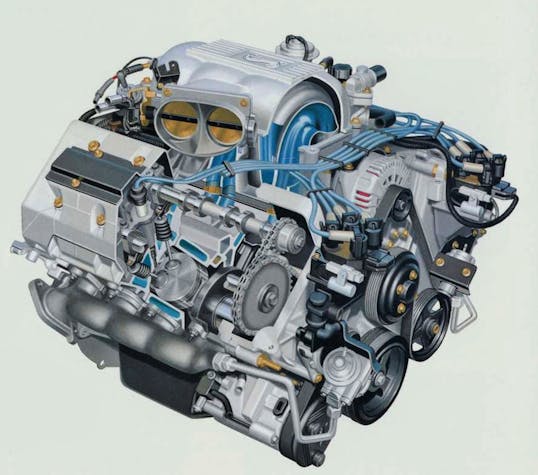Media | Articles
Piston Slap: Colder spark plugs for a hot Cobra?

Clayton writes:
Sajeev,
I recently (about 18 months ago) bought a 1996 Cobra Mustang—with 47,000 miles, the 4.6-liter aluminum DOHC motor, and a little sun damage on the paint—for a fair price (mid-teens). This purchase was based on my excellent experiences with a 1998 V-6 and a 1997 Mustang GT. So, my expectations were that I would have an even better experience with the more expensive, more powerful Cobra version of the SN95 Mustang.
On my eight-hour drive back home northward through the mountains of West Virginia, I noticed that the heat gauge was very high, at least compared to my previous Mustangs. Not quite in the red, but definitely in the high “Normal” range. This behavior continued as I started driving the Cobra on a semi-regular basis. Upon researching some forums and troubleshooting my new car, I came across a Technical Service Bulletin (TSB) 96-25-12 for the air-conditioning condenser, radiator, and fan for the first year of the Cobra 4.6L engine that basically said, “The fins on the A/C condenser are too tightly spaced, and if you live in a more southerly state, Ford will replace this condenser with a more free-flowing condenser, free of charge.” Some forums also added removing the grille insert. I went ahead and removed the grille insert, but I left the A/C condenser job for another day.
Fast-forward 12 months. The car now has 50,000 miles on it, and it began to misfire while driving it one morning. I immediately dropped it off at the Ford dealership for that “dealer only” inside knowledge that will definitely provide the right fix. The dealer provided the diagnosis: I had a fuel injector that appeared partially plugged, and I was due for new plugs and wires. Once he threw the repair cost at me, I told him that I was a “car guy” and I wasn’t going to pay $600 dollars to have someone change my plugs and wires, but to go ahead and change the fuel injector for me. (That way we both get ulcers from the situation, LOL.)

Meanwhile, I researched some forums to see what plugs to buy for the 4.6L DOHC. It seems that most people are using NGK’s that are one heat range lower than the factory plugs. I bought the NGK’s and some Ford High Performance replacement wires, and took care not to strip the aluminum heads. I got all the plugs and wires replaced, but here’s the kicker—the engine began running near the middle of the “Normal” range on the heat gauge!
I have put on another 1500 miles since the repair and it is running well. So here are some questions regarding my situation:
- The TSB tells the dealer to change the A/C condenser to fix the problem. Why would the engineer in charge of the TSB not know that changing the spark plugs would result in the same positive result to cool the engine?
- Is there some damage I am doing to my motor by running “colder” spark plugs?
- Why, if the factory cooling system is deficient, would colder plugs even help?
- It is possible to have an air leak that would cool the motor without throwing a code for the fuel mixture of the engine?
Sajeev answers:
As someone with this same motor (mostly) in their 1995 Lincoln Mark VIII, I thought I’d heard it all when it comes to the 32-valve 4.6-liter Modular Ford motor. I did all the online research back then and stuck with copper plugs in the factory heat range, as the Hot Rod Lincoln folks who bracket raced swore they ran cooler and had more power, proven via higher trap speeds on a consistent basis.
But that was 20-something years ago, and I probably got the justification all mixed up. But I still have some experience with this, so let me suggest an utterly shocking group of events that caused your situation:
- Those plugs needed replacement at 30,000 miles and are therefore heavily worn out.
- The previous owner never did an Italian tune up and just puttered around in traffic?
- The issues above caused a mild amount of pre-ignition and the misfire.
- Combined with the restrictive-ish cooling system of the 1996 Mustang, you have a perfect storm leading to a temperature gauge reading too hot in the normal range.
This could explain why new plugs magically fixed your hot running issue, and I wonder if using some in the stock heat range would also fix it. Not that I am suggesting you buy eight more plugs and undo your hard work, so perhaps let’s just answer your questions:
- Remember that the level of wear in your plugs and a possible pre-ignition condition is the most obvious culprit, and maybe the notion of Ford running a colder plug from the factory meant adding too many deposits in the combustion chamber. Keep in mind an OEM engineer’s tolerance for a balancing of power/emissions/durability is far different from yours. Regarding that potential pre-ignition issue, I’d also check the intake manifold’s EGR valve passage(s) and see if it also needs a cleaning.
- No damage will happen with colder plugs, but I bet there are combustion chamber deposits after all these years. Blow it all out with a few runs to redline in second gear and/or a Seafoam treatment.
- It’s not that the cooling system is deficient, rather it might slip out of an acceptable range if another factor (worn out copper spark plugs, combustion chamber deposits) compounds the problem.
- Any amount of an air leak would absolutely freak out the engine computer because the mass-air flow sensor no longer gives it accurate readings. You’d have much bigger drivability problems if that happened.
Whew! That was a marathon of a thought exercise for yours truly. Is my notion plausible? Got a better idea you’d like to share? Post it in the comments so the Hagerty Community can learn more.
Have a question you’d like answered on Piston Slap? Send your queries to pistonslap@hagerty.com—give us as much detail as possible so we can help! Keep in mind this is a weekly column, so if you need an expedited answer, please tell me in your email.
***
Marketplace
Buy and sell classics with confidence
Check out the Hagerty Media homepage so you don’t miss a single story, or better yet, bookmark it. To get our best stories delivered right to your inbox, subscribe to our newsletters.












All of Sajeev’s answer is a likely set of contributing factors to making an engine run warmer than prefered.
Taking the plug heat range question in isolation, a cooler plug simply cools faster and therefore maintains a lower temperature in the combustion chamber. Think of the spark plug’s heat range as a thermostat for the combustion chamber. The primary source of engine heat is the combustion chamber and a cooler combustion chamber makes for a cooler engine.
post hoc ergo propter hoc – a cautionary statement that basically means that just because one event happens after another, it does not mean it happened because of the other. I would keep an eye on the overheating issue in case it has not gone away.
Repair manuals from back in the day used to have guides for ‘reading’ plugs to determine if you have the right heat range. A lot of carbon – too cold. A lot of baked on white material – too hot. Worn but otherwise normal looking – just right. I don’t know if you still have the old plugs around, but you might want to have a look at them
Maybe while changing the plugs ( or the injector) the connector to the temp sensor was “ disturbed” and a high resistance connection “repaired itself”?
Ding ding ding
Partially clogged injector could cause lean running = heat.
This.
Yes, excellent point.
My guess is that when they replaced the injector the found a ground wire that wasn’t connected between the chassis and the frame. Way back when I did a valve job on my dad’s 1965 Rambler. After finishing, he claimed that the car was overheating, even though it didn’t spew any coolant. I had forgotten to connect a ground braid between the firewall and he head, so all of the current from the car was grounding through the temperature sensor lead, sending the gauge all the way over to “H”.
First sentence of my last post should read “between the chassis and the engine.”
The injector seems to be the most likely running hot contributor here.